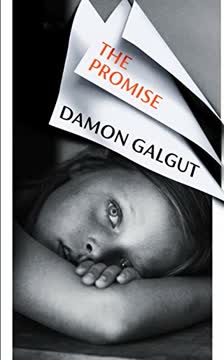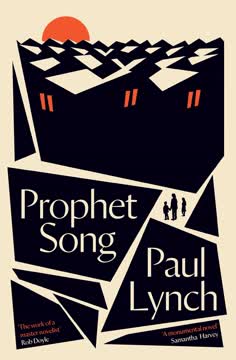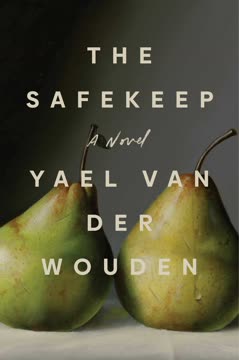Plot Summary
Death and the Promise
The novel opens with the death of Rachel Swart, matriarch of a white South African family. Her youngest daughter, Amor, receives the news at boarding school, and the family converges on their rural farm for the funeral. Amid the grief, a promise is made by Rachel's husband, Manie, to grant the family's black domestic worker, Salome, ownership of the house she lives in—a rare gesture in apartheid-era South Africa. This promise, extracted on Rachel's deathbed, is witnessed by Amor, who clings to it as a moral anchor. The moment is heavy with loss, confusion, and the weight of unspoken obligations, setting the stage for decades of family conflict and national change.
The Family Gathers
The Swart family—Manie, his children Anton, Astrid, and Amor, and extended relatives—gather at the farm. The atmosphere is thick with unresolved resentments, religious differences, and the awkwardness of mourning. Manie's Afrikaner relatives judge Rachel's return to Judaism, while the children process their loss in different ways. Salome, the black maid, moves quietly in the background, her presence both essential and overlooked. The family's dysfunction is palpable, with each member retreating into their own pain or pettiness. The promise to Salome is quickly buried under the logistics of death, inheritance, and the rituals of white South African life.
Salome's Invisible Labor
Salome, who has cared for the Swart family for decades, is both central and invisible. She tended to Rachel in her final illness, performing the most intimate and difficult tasks, yet is excluded from the funeral and family discussions. Her son Lukas, growing into manhood, is aware of the injustice but powerless. The promise of the house is a distant hope, overshadowed by the realities of race, class, and the family's reluctance to honor it. Salome's endurance and quiet dignity contrast with the Swarts' self-absorption, highlighting the deep inequalities that persist even in moments of supposed generosity.
Anton's Return
Anton, the eldest son, returns from military service, haunted by his actions during South Africa's violent unrest. He is emotionally volatile, burdened by guilt over a killing in the townships and his mother's death. The family's expectations and his own sense of failure collide, leading to confrontations with his father and siblings. Anton's relationship with Amor is distant, but she alone remembers the promise to Salome. The family's inability to communicate or heal is mirrored in Anton's internal turmoil, as he struggles to find purpose and redemption in a country on the brink of transformation.
The Unkept Vow
As years pass, the promise to Salome is neglected. The Swarts are consumed by their own dramas—marriages, divorces, careers, and the slow decline of the farm. South Africa changes around them: apartheid ends, democracy dawns, but the family's attitudes and behaviors remain stubbornly unchanged. Amor, now an adult, is the only one who remembers the vow, but her efforts to fulfill it are met with resistance and legal obstacles. The land, once a symbol of security and identity, becomes a site of contestation, reflecting the broader uncertainties of the new South Africa.
The Funeral and Aftermath
Each major family death—Rachel, Manie, Astrid, Anton—serves as a pivot point, bringing the Swarts together and then scattering them again. Funerals are occasions for old grievances to resurface, for the reading of wills, and for the question of Salome's house to be raised and dismissed. The rituals of mourning are hollow, unable to bridge the emotional and moral gaps between the characters. The family's decline is mirrored in the decay of the farm and the erosion of their social standing, as the world they once knew slips away.
The Years Unravel
The narrative leaps forward in time, marking the deaths of each Swart parent and sibling. With each loss, the family shrinks, and the promise to Salome becomes more abstract. Amor drifts through life, working as a nurse, estranged from her siblings and the land. Anton spirals into addiction and despair, Astrid pursues status and security, and the farm falls into neglect. The changing political landscape—elections, land claims, the rise and fall of leaders—forms a backdrop to the family's personal failures and missed opportunities.
Estrangement and Exile
The Swart siblings grow apart, separated by geography, ideology, and unresolved trauma. Anton goes AWOL, living on the margins; Astrid seeks comfort in religion and material success; Amor flees to London and later Durban, seeking anonymity and escape from her family's legacy. Communication breaks down, and the promise to Salome is all but forgotten. The sense of exile—both literal and emotional—pervades their lives, as each struggles to find meaning in a world that no longer fits their expectations.
The Father's Fall
Manie's later years are marked by religious fervor, business schemes, and a desperate attempt to hold onto the past. His death, the result of a reckless stunt involving venomous snakes, is both absurd and tragic. The reading of his will reveals the extent of his debts and the unresolved issue of Salome's house. The family is forced to confront the consequences of their neglect, as legal and moral debts come due. The farm, once a symbol of continuity, is now a burden, its future uncertain.
The Will and the Land
The division of the Swart estate becomes a battleground. The will is ambiguous, the land entangled in claims and counterclaims. Amor pushes for Salome to receive the house, but is met with bureaucratic inertia and family resistance. The legal system, designed to protect white property, offers little recourse. The promise, once a simple act of kindness, is now a complex legal and ethical dilemma. The family's inability to act reflects the broader failures of post-apartheid reconciliation and restitution.
The Rainbow Nation's Illusion
The Swarts' story unfolds against the backdrop of South Africa's transition to democracy. The euphoria of the Rainbow Nation—Mandela's presidency, the Rugby World Cup, the promise of equality—contrasts with the persistent realities of inequality, violence, and unhealed wounds. The family's struggles mirror the nation's: the difficulty of change, the persistence of old hierarchies, and the challenge of making good on promises. The illusion of unity is shattered by personal and collective failures.
Astrid's Fate
Astrid, the middle child, is murdered in a carjacking, her life marked by fear, insecurity, and a desperate search for love and validation. Her death is senseless, another statistic in a country plagued by crime. The family's response is muted, shaped by exhaustion and resignation. Astrid's secrets—her affairs, her confessions—remain unresolved, and her children are left to navigate a world without her. The cycle of loss and disappointment continues, with no catharsis or closure.
The Final Gathering
With only Amor and Desirée (Anton's widow) left on the farm, the family's story nears its end. The house is dilapidated, the land contested, and the promise to Salome still unfulfilled. Amor returns, determined to honor her mother's wish and her own conscience. She confronts Desirée, the lawyer, and finally Salome and Lukas, offering them the house and the accumulated inheritance. The gesture is met with skepticism and anger, a reminder that restitution cannot undo decades of injustice.
Anton's Descent
Anton's final years are marked by alcoholism, failed relationships, and a sense of futility. He is haunted by his past, unable to write the novel he once dreamed of, and estranged from everyone who might care for him. His suicide is both an act of despair and a final escape from the burdens of family, history, and self. The aftermath is practical and unsentimental: a cremation, a scattering of ashes, and the closing of another chapter in the family's decline.
Amor's Return
Amor's return to the farm is quiet and determined. She sorts through Anton's belongings, reads his unfinished novel, and reflects on the meaning of family, memory, and obligation. She arranges for Salome to receive the house and the money, navigating the legal and emotional obstacles with patience and resolve. The act is both a fulfillment of the promise and an acknowledgment of its limitations. Amor's kindness is understated but profound, a final attempt to set things right in a world that resists justice.
The Last Act of Kindness
The transfer of the house to Salome is met with mixed emotions. Lukas, embittered by a lifetime of disappointment, rejects the gesture as too little, too late. Salome, weary but grateful, accepts it with dignity. The moment is fraught with the complexities of history, race, and power. Amor's act is not redemptive, but it is necessary—a small, imperfect step toward honoring the promise and acknowledging a debt. The rain that falls on the farm is both a symbol of renewal and a reminder of the cycles that persist.
Letting Go
The novel ends with Amor scattering Anton's ashes and preparing to leave the farm for good. The family is gone, the land is no longer theirs, and the promise has been kept as best as possible. There is no grand reconciliation, only the quiet satisfaction of having done what was right, however belatedly. The story closes on a note of acceptance: of loss, of change, and of the impossibility of perfect justice. The past cannot be undone, but kindness endures, even in small, imperfect acts.
Characters
Amor Swart
Amor is the youngest Swart sibling and the novel's conscience. Sensitive, introverted, and often overlooked, she is marked by a childhood trauma—being struck by lightning—and by her mother's dying wish. Unlike her siblings, Amor is driven by a sense of justice and empathy, particularly toward Salome. Her life is shaped by exile and return: she flees the family and the country, working as a nurse, but is repeatedly drawn back by duty and memory. Amor's psychological depth lies in her struggle to reconcile personal pain with a broader sense of responsibility. Her development is subtle but profound: from a passive witness to an active agent of restitution, she embodies the possibility of change, however limited.
Anton Swart
Anton, the eldest, is a complex figure—intelligent, sensitive, but deeply damaged by his experiences as a conscript in the apartheid military. He is burdened by guilt, both for his actions in the townships and for his failures as a son, brother, and writer. Anton's relationships are fraught: he is estranged from his father, distant from his sisters, and unable to sustain intimacy. His psychological arc is one of decline: from youthful promise to addiction, alienation, and suicide. Anton's inability to fulfill his potential or keep the family together mirrors the failures of his country and generation.
Astrid Swart
Astrid is defined by insecurity, vanity, and a desperate need for approval. She seeks comfort in religion, marriage, and material success, but is never at peace. Her relationships are transactional, and she is haunted by fears—of poverty, violence, and being unloved. Astrid's psychological fragility is exposed by her tragic death, a random act of violence that underscores the vulnerability of white South Africans in the new order. Her inability to confront the family's moral failings or her own complicity is emblematic of a broader societal denial.
Manie Swart
Manie is a product of Afrikaner nationalism and white entitlement. He is rigid, self-righteous, and ultimately undone by his own contradictions—his religious zeal, his business failures, and his inability to adapt to change. Manie's promise to Salome is sincere but quickly forgotten, a casualty of his self-interest and the inertia of privilege. His death, the result of a reckless stunt, is both comic and pathetic, a symbol of the end of an era.
Salome
Salome is the Swart family's black domestic worker, present for decades but never fully seen or acknowledged. Her life is one of service, sacrifice, and quiet suffering. The promise of the house is both a hope and a reminder of her marginalization. Salome's dignity and resilience stand in contrast to the Swarts' dysfunction. Her eventual receipt of the house is bittersweet, a small victory in a lifetime of losses. Psychologically, she is shaped by endurance and a capacity for forgiveness, but also by the scars of exploitation.
Lukas
Lukas grows up on the margins of the Swart family, witnessing both their privilege and their failures. As an adult, he is embittered by broken promises and systemic injustice. His confrontation with Amor at the novel's end is charged with anger and disappointment, reflecting the limits of restitution and the persistence of inequality. Lukas represents a new generation, unwilling to accept crumbs or gratitude for what should have been his by right.
Tannie Marina
Marina is Manie's sister, a figure of authority and judgment. She embodies the values of the old order: family loyalty, racial hierarchy, and religious certainty. Her practical skills—baking, organizing—mask a deep need for control and validation. Marina's relationship with the Swart children is ambivalent: she is both caretaker and critic, her affection laced with resentment. Psychologically, she is driven by fear of change and a desire to maintain the status quo.
Ockie
Ockie, Marina's husband, is a minor but telling figure. Retired, alcoholic, and largely ineffectual, he represents the fading authority of white men in the new South Africa. His presence is marked by inertia and nostalgia, a longing for a world that no longer exists. Ockie's relationship with the family is distant, his role more symbolic than active.
Desirée
Desirée enters the family as Anton's wife and outlives him, inheriting the decaying farm and its burdens. She is pragmatic, self-interested, and ultimately detached from the Swart legacy. Her relationship with Amor is wary but transactional, shaped by the practicalities of inheritance and survival. Desirée's psychological resilience is matched by a certain coldness, a refusal to be defined by the family's failures.
Alwyn Simmers
Simmers is the family's spiritual advisor, a figure of both comfort and exploitation. He benefits materially from the Swarts' patronage, securing land and influence through their generosity and guilt. Simmers' religiosity is self-serving, his sermons empty of real compassion. Psychologically, he is driven by ambition and a talent for self-justification, embodying the ways in which faith can be used to mask or perpetuate injustice.
Plot Devices
Multi-generational Family Saga
The novel uses the Swart family's story as a microcosm of South Africa's journey from apartheid to democracy. Each death marks a new era, with the family's fortunes and failures reflecting the broader social and political changes. The structure—divided into sections by funerals—emphasizes the passage of time and the persistence of unresolved issues.
The Unkept Promise
The promise to give Salome her house is the novel's central plot device, recurring at each major turning point. It serves as a test of conscience for the characters, especially Amor, and as a symbol of the nation's unfinished business with its past. The repeated failure to honor the promise exposes the limits of good intentions and the inertia of privilege.
Shifting Perspectives and Narrative Voice
The narrative moves seamlessly between characters' thoughts, memories, and actions, often using a second-person or omniscient voice. This technique creates intimacy and distance, allowing the reader to inhabit multiple perspectives while maintaining a critical detachment. The voice is ironic, compassionate, and unsparing, exposing both the characters' flaws and their humanity.
Foreshadowing and Recurrence
The novel is rich in foreshadowing: the lightning strike that marks Amor's childhood, the repeated funerals, the decay of the farm, and the unchanging dynamics of power and exclusion. Events and motifs recur—promises made and broken, land contested, rituals performed—emphasizing the difficulty of real change.
Symbolism of Land and Home
The farm is both a setting and a symbol: of belonging, exclusion, and the weight of history. The struggle over Salome's house encapsulates the larger issues of restitution and justice in post-apartheid South Africa. The land is both precious and poisoned, a source of identity and conflict.
Analysis
Damon Galgut's The Promise is a searing meditation on family, history, and the elusive nature of justice in South Africa. Through the decline of the Swart family, the novel interrogates the legacies of apartheid, the failures of reconciliation, and the persistence of inequality. The unkept promise to Salome is both a personal and national allegory: a symbol of good intentions thwarted by inertia, self-interest, and systemic barriers. Galgut's narrative style—fluid, ironic, and deeply empathetic—lays bare the psychological wounds of his characters, exposing the ways in which trauma, guilt, and denial shape both individuals and societies. The novel resists easy redemption: restitution, when it comes, is partial and belated, and the wounds of the past cannot be fully healed. Yet in Amor's quiet persistence and final act of kindness, there is a glimmer of hope—a recognition that justice, however imperfect, is still worth pursuing. The Promise is ultimately a story about the cost of forgetting, the necessity of remembering, and the possibility of change, however small, in a world marked by loss and longing.
Last updated:
Review Summary
The Promise by Damon Galgut received widespread acclaim, winning the 2021 Booker Prize. Set in post-apartheid South Africa, it follows the Swart family over decades, exploring themes of racial tension, broken promises, and societal change. Critics praised Galgut's masterful prose, innovative narrative style, and complex characters. While some found it challenging, many appreciated its depth and social commentary. The novel's exploration of white privilege and South Africa's political landscape resonated with readers, though a few found it overly cynical or difficult to engage with.















